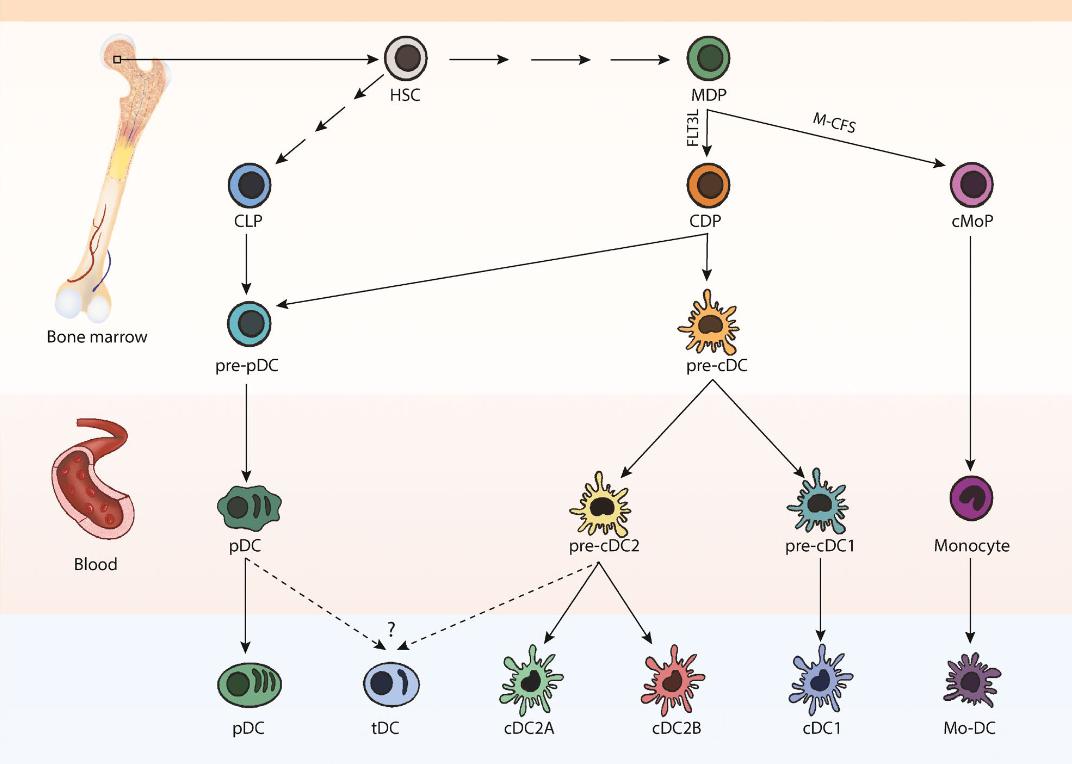Immunomics Services
Immunomics Services for Dendritic Cells
Dendritic cells (DC) are a class of bone marrow-derived cells of lymph-myelopoietic origin that form an important interface between the innate perception of pathogens and the activation of adaptive immunity. Over the years, multiple cell types have been referred to as DCs based on their phenotypic and functional properties. CD Genomics offers several types of immunomics services to support clients in understanding and analyzing the function of DCs and continues to provide new translational opportunities for medicine.
Introduction to Dendritic Cells
DCs are a class of bone marrow-derived cells found in blood, tissues, and lymphoid organs that belong to the innate immune cells because they recognize and respond to pathogen-associated and danger-associated signals to form acute inflammatory responses. They connect the innate and adaptive parts of our immune system. They are antigen-presenting cells of the mammalian immune system and have a decisive role in adaptive immunity by processing extracellular and intracellular proteins and presenting antigens in the context of MHC molecules to initiate naive T cells.
Classification of Dendritic Cells
Comparative gene expression studies have driven a robust classification of DCs based primarily on lineage, which allows the identification of plasmacytoid cell DCs (pDC) and two types of 'conventional' or 'classical' DCs (cDC). The differentiation of pre-DC is associated with differential expression of key transcription factors such as interferon regulatory factors 8 and 4 (IRF8 and IRF4). The pre-DC stage appears to have been pre-committed to the development of one of two cDC subtypes, which include type 1 (cDC1) and type 2 (cDC2) cells by different transcription factors.
 Fig.1 Major mouse DC subsets. (Bošnjak, B., et al.,
2022)
Fig.1 Major mouse DC subsets. (Bošnjak, B., et al.,
2022)
| pDC | tDC | cDC2A | cDC2B | cDC1 | Mo-DC | |
| Expression Markers |
CD45+ MHCII+ CD11blow CD11cint CD45R/B220+ CD317/PDCA1++ Siglec H+ Ly6C+ CX3CR1- |
CD45+ MHCII+ CD11blow CD11cint CD45R/B220+ CD317/PDCA1+ Siglec H+ Ly6C+ CX3CR1+ |
CD45+ MHCII+ CD11b+ CD11c+/int SIRPα/CD72a+ T-bet+ |
CD45+ MHCII+ CD11b+ CD11c+/int SIRPα/CD72a+ RORγ+ Clec12a+ Clec10a+ |
CD45+ MHCII+ CD11b- CD11c+ |
CD45+ MHCII+/low CD11b+ CD11c+ Ly6C+/low CD64+ F4/80+ MER(MERTK)+ |
| Lymphatic Tissue-specific Markers | - | - | CD4+ | CD4+ | Clec9A/DNGR-1- CD8α+ |
- |
| Lung-specific Markers | - | - | CD24+ | CD24+ | CD24+ CD103+ CD207/Langerin+ |
- |
| Intestine-specific Markers | - | - | CD103+ | CD103- | CD103+ Clec9a/DNGR-1+ |
- |
| Skin-specific Markers | - | - | CD301b-(?) | CD301b+(?) | - | - |
Immunomics Studies for Dendritic Cells
The incredible heterogeneity and diversity of DCs are well-matched to the precise and complex function of the immune system. In humans, a variety of external threats cause the immune system to mount an effective defense response. However, an excessive immune response can lead to intolerance to autoantigens. Multiple omics approaches, particularly single-cell RNA sequencing (scRNA-seq) based on third-generation sequencing technologies, have revolutionized the study of DC, providing insights into DC heterogeneity and ontogeny.
Our Services
Identifying a comprehensive atlas of DC subtypes and assessing their biomarkers, cell lineage and role in immune-related diseases remains challenging due to technical and methodological limitations. CD Genomics offers several types of immunomics services to provide clients with a new perspective and a rational approach to the study of DC.
Why Choose Us
CD Genomics is experienced in the histological study of immune cells and is able to provide clients with a reliable immunomics analysis service for DCs. We collaborate intensively with our clients to help them resolve bottlenecks in their projects. Please contact us for more information.
Reference
- Bošnjak, B., Do, K. T. H., Förster, R., & Hammerschmidt, S. I. (2022). Imaging dendritic cell functions. Immunological Reviews, 306(1), 137-163.
